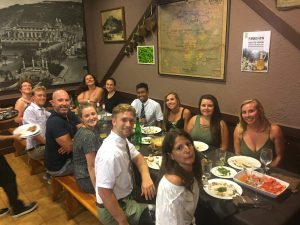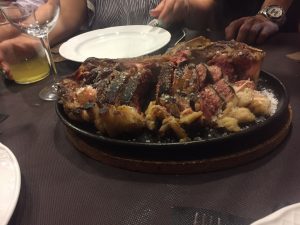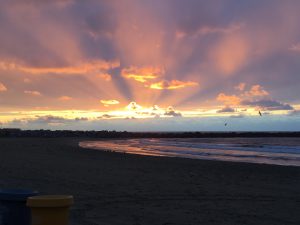The past, the present, and the future — as our final days wind down in San Sebastián, that is what I find myself thinking about the most. As college students from the United States, everyone is always asking, “When are you going to graduate?” or “What are you going to do with your life?”. Myself, having endured these questions many times before, have come up with a bulleted list in my head of how to make it sound like I have all of my ducks in a row — or in other words, to act like I have any idea what the future holds.
The truth is, I haven’t the slightest idea.
At the end of our first week in San Sebastián, Professor Zabalbeascoa took us to see the Combs of the Wind, sculpted by Eduardo Chillida. Giant iron fingers reached from the rocks on the coast, forming three distinct figures. Professor Zabalbeascoa asked us what we thought these sculptures represented, and to be honest, I was stumped. At first, they just looked like iron fingers coming up from the rocks. After a few ideas, he told us his favorite interpretation of the sculpture — that one each represented the past, the present, and the future. The past, off to the right, at first appeared twisted and scarred, but upon second thought was quite beautiful, as it pointed towards the future with a concrete surety. The present, the one that we could touch, was the most clear, the one that felt as though we ourselves could examine with the most truth. Finally, looking through the present we saw the future, looking upwards towards the sky, far off in the distance, looking open to change, and to be filled with whatever the world has to offer.
Professor Zabalbeascoa then took out a pen and put it on his finger. He explained that there has to be a balance between the past and the future in order for us to become balanced in the present. Without this, the pen would fall — just as our minds would become clouded and worried too much in one place or the next.
Then, I thought of the past three weeks we had spent together. I thought of how most of us were total strangers, hopping on planes to bring us to a place that none of us had ever known. I thought of how since then we have shared food, stories, classes, feelings, and most importantly, the memories that we have made here. From trying pinxtos (for better or for worse), to climbing seemingly insurmountable mountains, to resting on the beautiful shores of La Concha and Zurriola, to immersing ourselves in new languages and cultures, and finally to doing more than many of us had ever imagined doing — I felt inspired by all that I had once thought impossible.

I thought back even further then, to the ancient past of the Basques, the people and the culture we came here to learn about in the first place. I remembered the few words of Euskera that somehow stuck in my head — a language unlike any other in the word. I remembered the museums we visited, learning about how the Basques built their ships to bring whales home to provide light and heat. I thought of Gernika, and how a society that had been put through so much pain, dedicated their lives to peace and helping others find it.
As we have immersed ourselves in this culture, we have tried not to be that typical American tourist that the world often perceives us as. We spoke Spanish, Euskera, and French. We asked questions to our host families about their past and why they do what they do. We took the paths less traveled, so that we may see things not from the flashy bus, but from where they were meant to be seen. We learned too that there are multiple sides to history, and that no one side is completely in the right — as we saw the impact the pact of forgetting had on the youth of the people. We learned why the Basques are such a proud, kind, and optimistic people today. Even though they have been through atrocities in the past, both due to Franco’s dictatorship and the scars left by their own terrorists, the Basque people continue to celebrate their traditions, their heritage, their language, and their lives. They have taught us the definition of the word resiliency, and how kindness is more powerful than any weapon.
The past, be it for better or for worse, shapes us into who we are today. Before we came here, I found myself struggling with my own past — believing that my family would be the ones who defined all that I was or ever would be. I realize now that while the past was what brought all of us to this moment in time, it does not define who we are — that power belongs to the present moment.
As I sat at our final dinner as a group (granted this is in the very recent past, only a few hours ago), I found myself feeling connected entirely to one another. All that mattered was that we were together, enjoying some of the most amazing food in the world, celebrating what we had done, and what we are going to do. We smiled and laughed at our triumphs and our slip-ups (granted there were many), we marveled at the beautiful food brought before us, and more than anything, we simply enjoyed one another´s company. Before we came here, most of us were complete strangers, only known by a name in an email or a short conversation at the pre-departure meeting; these same people have now become friends that we will hold onto for a lifetime to come. In that moment the past and the future were in balance to make the perfect present.

And it is in that present moment that I realized that we have the power to be whoever it is that we want to be. It doesn’t matter what you study in school, how much money you make, or where you came from in life. What matters is this moment in your life now, and what you are going to do with the precious gift that is this life that we have. While the past gave us the circumstances of our present, it is our present that gives us the chance to make the decisions that will lead to the circumstances of the future.
Again, looking at the culture we have learned so much about, the Basque culture continues to grow and change, even in this present moment. Euskera has become a part of daily life (instead of something to be censored and hidden), and is the first language children learn. Pinxto pote in Gros, first started to help bars during the economic crisis, has now become a social tradition of joy and merriment. Even in this ever changing, globalized world, the Basques still find a way to show the world their beautiful spirit and culture.
And now, what everyone asks us college kids about, the future. Like I said, I have no idea what it is going to entail. All I do know is that I have learned so much, experienced more than I ever thought I could, and have been blessed with an experience that has completely changed my life for the better.
The best gift Donostia gave me was the ability to live in the present — to love this life and all it has to offer, because I promise you, it’s more than worth it.
Agur, Donostia.

